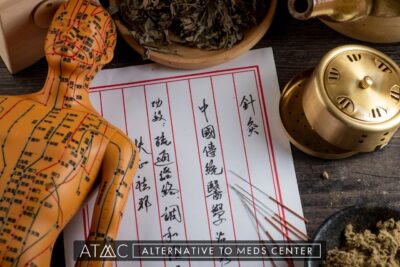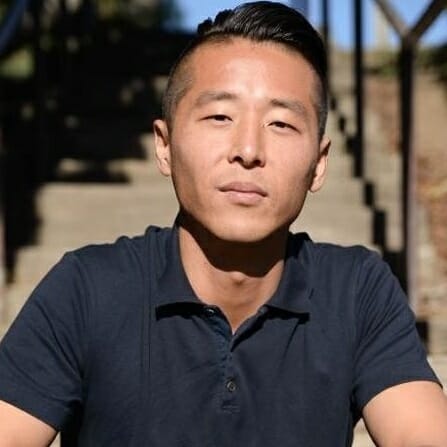Last Updated on April 19, 2024 by
Alternative to Meds Editorial Team
Table of Contents:
drug-free relief from pain!

Last Updated on April 19, 2024 by
Alternative to Meds Editorial Team


Modern medicine acknowledges that acupuncture gently manipulates neurohormonal pathways, effectively restoring healthy nerve function and improving blood flow.
In traditional Chinese medicine, acupuncturists believed that the needles released the body’s qi from blocked points on the body, restoring the flow of qi to “meridians,” sometimes called “acupoints” within the body. Restoring qi flow is the traditional understanding of how acupuncture improves overall health, diminishes pain symptoms, and provides a reliable and safe alternative to addictive painkillers.
The CNS is a magnificently complex system of interchange and relay involving all the vital systems throughout the body and tracking the neurological benefits of acupuncture has been shown in many lab and clinical studies in modern times. Please take time to review the cited references below this article for more information.
Opioids have a near instant numbing effect on pain. Non-drug treatments such as acupuncture are more gradual and gentle. Each have their own best applications, but addiction, risk of overdose, death, and other risks are only prevalent with opioids.
A massive review on the benefits of acupuncture was published in JAMA, 2022, where hundreds of carefully vetted clinical trials and case histories showed that acupuncture is used effectively for a wide variety of complaints and conditions.10

Modern understanding of acupuncture revolves around its neurohormonal properties. Essentially, activating a nerve with an acupuncture needle triggers a hormonal response, which may assist in pain relief and actual healing. People undergoing acupuncture may feel slight sensations of euphoria and relaxation thanks to the brain’s release of endorphins and other neurotransmitters. This effectively diminishes pain sensations, without introducing the risks of addiction and other negatives associated with opioid use.
Automobile fatalities numbered just under 43,000 in 2021, and the same in 2022. To compare, opioid use killed more than twice that many, approx. 109,000.11,12 Death isn’t the only risk, as you can see in the list below.
Anyone currently taking opioid pain medications is subject to the risks these substances entail, especially with repeated use over an extended period of time.
Acupuncture does not involve introducing any chemicals into the body. It is an entirely holistic process with thousands of years of history behind it, and it continues to be a trusted pain management treatment to this day. Acupuncture can help various medical conditions, so consider how it may benefit your unique medical situation and could function as an alternative to potentially dangerous opioid drugs.
1. Lu DP, Lu GP. An Historical Review and Perspective on the Impact of Acupuncture on U.S. Medicine and Society. Med Acupunct. 2013 Oct;25(5):311-316. doi: 10.1089/acu.2012.0921. PMID: 24761180; PMCID: PMC3796320. [cited 2024 April 12]
2. Nenggui Xu, et al., Evidence on acupuncture therapies is underused in clinical practice and health policy, published in BMJ BMJ 2022;376:e067475 [cited 2024 April 12]
3. Amin U, Jiang R, Raza SM, Fan M, Liang L, Feng N, Li X, Yang Y, Guo F. Gut-joint axis: Oral Probiotic ameliorates Osteoarthritis. J Tradit Complement Med. 2023 Jun 20;14(1):26-39. doi: 10.1016/j.jtcme.2023.06.002. PMID: 38223812; PMCID: PMC10785157. [cited 2024 April 12]
4. Bamalan OA, Moore MJ, Al Khalili Y. Physiology, Serotonin. [Updated 2023 Jul 30]. In: StatPearls [Internet]. Treasure Island (FL): StatPearls Publishing; 2024 Jan-. Available from: https://www.ncbi.nlm.nih.gov/books/NBK545168/ [cited 2024 April 12]
5. Sonne J, Goyal A, Lopez-Ojeda W. Dopamine. [Updated 2023 Jul 3]. In: StatPearls [Internet]. Treasure Island (FL): StatPearls Publishing; 2024 Jan-. Available from: https://www.ncbi.nlm.nih.gov/books/NBK535451/ [cited 2024 April 12]
6. Smith MD, Maani CV. Norepinephrine. [Updated 2023 May 8]. In: StatPearls [Internet]. Treasure Island (FL): StatPearls Publishing; 2024 Jan-. Available from: https://www.ncbi.nlm.nih.gov/books/NBK537259/ [cited 2024 April 12]
7. Chaudhry SR, Gossman W. Biochemistry, Endorphin. [Updated 2023 Apr 3]. In: StatPearls [Internet]. Treasure Island (FL): StatPearls Publishing; 2024 Jan-. Available from: https://www.ncbi.nlm.nih.gov/books/NBK470306/ [cited 2024 April 12]
8. Cullen JM, Cascella M. Physiology, Enkephalin. [Updated 2023 Mar 20]. In: StatPearls [Internet]. Treasure Island (FL): StatPearls Publishing; 2024 Jan-. Available from: https://www.ncbi.nlm.nih.gov/books/NBK557764/ [cited 2024 April 12]
9. Zhou J, Peng W, Xu M, Li W, Liu Z. The effectiveness and safety of acupuncture for patients with Alzheimer disease: a systematic review and meta-analysis of randomized controlled trials. Medicine (Baltimore). 2015 Jun;94(22):e933. doi: 10.1097/MD.0000000000000933. PMID: 26039131; PMCID: PMC4616366. [cited 2024 April 12]
10. Allen J, Mak SS, Begashaw M, Larkin J, Miake-Lye I, Beroes-Severin J, Olson J, Shekelle PG. Use of Acupuncture for Adult Health Conditions, 2013 to 2021: A Systematic Review. JAMA Netw Open. 2022 Nov 1;5(11):e2243665. doi: 10.1001/jamanetworkopen.2022.43665. Erratum in: JAMA Netw Open. 2023 Feb 1;6(2):e233459. PMID: 36416820; PMCID: PMC9685495. [cited 2024 April 12]
11. US Dept of Transportation Roadway Fatalities Report 2021 – 2022 published online 2021 [cited 2024 April 12]
12. CDC Routes of Drug Use among Drug Overdose Deaths 2020-2022 published online Feb 15, 2024 [cited 2024 April 12]

Dr. Samuel Lee is a board-certified psychiatrist, specializing in a spiritually-based mental health discipline and integrative approaches. He graduated with an MD at Loma Linda University School of Medicine and did a residency in psychiatry at Cedars-Sinai Medical Center and University of Washington School of Medicine in Seattle. He has also been an inpatient adult psychiatrist at Kaweah Delta Mental Health Hospital and the primary attending geriatric psychiatrist at the Auerbach Inpatient Psychiatric Jewish Home Hospital. In addition, he served as the general adult outpatient psychiatrist at Kaiser Permanente. He is board-certified in psychiatry and neurology and has a B.A. Magna Cum Laude in Religion from Pacific Union College. His specialty is in natural healing techniques that promote the body’s innate ability to heal itself.
Originally Published Apr 15, 2019 by Diane Ridaeus

Diane is an avid supporter and researcher of natural mental health strategies. Diane received her medical writing and science communication certification through Stanford University and has published over 3 million words on the topics of holistic health, addiction, recovery, and alternative medicine. She has proudly worked with the Alternative to Meds Center since its inception and is grateful for the opportunity to help the founding members develop this world-class center that has helped so many thousands regain natural mental health.
Can you imagine being free from medications, addictive drugs, and alcohol? This is our goal and we are proving it is possible every day!
Read All StoriesView All Videos